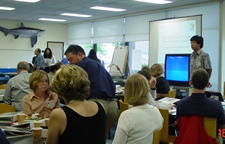OSEI I
-by Bob Chen, UMASS Boston

On May 10, 2003, NE-COSEE launched the Ocean Science Education Institute (OSEI). The goal of this ambitious program was to bring scientists and educators together to introduce the excitement of current ocean research into the middle school classroom. Over the next nine months, seven researchers, sixteen middle school teachers, and a talented group of marine educators gathered for eight intensive sessions to share resources and expertise, organize lasting networks between the research and education communities, and develop research-based lesson plans based on the best ocean science education practices and resources. For scientists, it was an opportunity to introduce teachers and students to advances in ocean science and raise awareness and support for future research. For teachers, it was an opportunity to learn more about ocean science, get to know the scientists, and find out about local resources that are available.
The introductory session in May kicked off with an inspirational multimedia presentation by David Gallo, the director of special projects at the Woods Hole Oceanographic Institution (WHOI). His presentation highlighted recent trends in oceanography and examples of research taking place at WHOI. Next, education consultant Kathy Brown talked about inquiry-based learning. Teachers encourage students to make observations and then to ask questions and seek explanations about what they see, just as scientists do. Sue Nourse of Tabor Academy in Marion, Mass, and Don Lewis of the Massachusetts Audubon Society then talked about a successful project in which students help researchers monitor diamondback terrapins, a common coastal marine turtle. The students venture out into the field, find the turtles, measure and sex them, then provide their data to the researchers.
The workshop participants then broke up into small discussion groups and worked on breaking down barriers between researchers and educators. As a result, a mutual respect for both professions began to form.
The Ocean Science Education Institute came back together in July for an intense week of research presentations, field trips, and brainstorming. Thirty-minute talks by area scientists covered topics ranging from carbon cycle research, nutrient enrichment, and invasive Asian shore crabs. Fieldtrips included a Boston Harbor cruise and trips to a salt marsh and intertidal area. Participants collected water and sediment samples, had lessons in mapping and navigation, and learned about both the natural and human histories of the areas.
At the end of each day, the participants brainstormed ideas for research-based activities and lesson plans based on what they had learned. Ideas included making plankton out of craft material and racing them to see which sank the slowest, calculating a ship’s speed by measuring the time and distance between two buoys, and measuring shore crab carapaces. On the final day, the participants worked on a plan to ensure further interactions between scientists and educators and apply the research-based lesson plans in the classroom.
The participants met twice more in December and January after they had had a chance to try out their new lesson plans in the classroom. They discussed their classroom experiences, ways that the lesson plans could be improved, and the success of the first OSEI as a whole. Teachers and researchers also learned about existing resources and funding opportunities. Several of the teachers are helping to plan OSEI-2 for 2004–2005. They are now a significant part of the NE-COSEE network and will be informed of many other ocean science education opportunities.
The goals of the first OSEI were ambitious: Introduce up to 2,400 middle-school students to ocean science research in 2003. Form lasting partnerships between scientists and educators. Create adaptable lesson plans that can be shared throughout the country. The feedback from teachers and scientists participating in this first workshop has been positive. Important lessons that were learned from the first workshop will be incorporated into an even better OSEI-2 (2004–2005). The hope is that these workshops will have a lasting impact on middle school education and will serve as a successful model for other workshops throughout New England and the country.
OSEI I - Lessons Learned
The first sessions of the NE-COSEE Ocean Science Education Institute (OSEI) was held in July 2003, at the UMass Boston Campus. The intense week blended short research talks, field experiences in Boston Harbor, a coastal salt marsh and the intertidal zone. In addition, teachers and researchers experienced inquiry-based ocean science lesson plans and activities led by educational consultant, Kathy Brown. The team of organizers and facilitators led by Rick Atkins (of the UMass Center for Teaching and Learning) and Bob Chen (UMassBoston) included Bill Andrake (Swampscott Public Schools), Cheryl Belknap (New Bedford Oceanarium), Jack Crowley (Mass Marine Educators), Debbie Fillis (UMassBoston), Sukey Padawer (New England Aquarium), and Andrea Thorrold (Woods Hole Oceanographic Institution). At the end of the week, teachers and researchers collaborated to develop a research-based ocean science lesson plan to be implemented during the fall in the classroom of the teachers.
To promote program sustainability and effectiveness, NE-COSEE evaluated all aspects of the Ocean Science Education Institute. Carol Baldassari, Senior Research Associate and Jodi Sandler, Research Associate, from the Program Evaluation and Research Group at Lesley University in Cambridge, MA, conducted interviews and administered surveys to all OSEI scientists, teachers, and facilitators. Evaluations about program design, content, and recommendations for the future were provided.